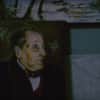Teen Suicide should really change their name. They always say they’re going to, but they never do—one of a few confusing, even frustrating, things about them. I've never really understood the difference between Teen Suicide and Julia Brown, a band with a similar lineup and a similar sound. Or a similar range of sounds: frontman Sam Ray’s many remarkable projects always seem less like distinct entities and more like overlapping blobs on a weird Venn Diagram that encompasses every genre.
The 26-track It’s the Big Joyous Celebration, Let’s Stir The Honeypot is aptly titled: said to be Teen Suicide’s final album (or maybe, again, just the last under this name), it is an all-inclusive, incredible LP basically only bounded by its running time. So, so, so many things happen: vocals are normal or hollow or pitched-up or Auto-Tuned; some songs are just dusty piano, while others have full bands, and some have only synths, or are almost house tracks, and yet others—my personal favorites—somehow combine all that into some of the best sample-based rock & roll in a decade.
Perhaps it is no surprise that the prolific musician behind Teen Suicide is also a somewhat prolific writer. Sam Ray’s releases often accompanying by considered exegeses of their themes and their complicated creation. To mark the occasion of this Big Joyous Celebration, available today via Run For Cover Records, here he leads a tour through some of the album’s most deeply affecting songs.


